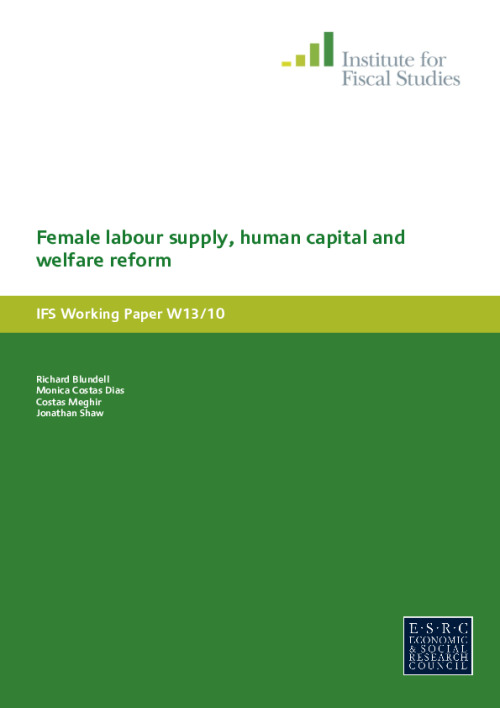Downloads

wp201310.pdf
PDF | 1.31 MB
We consider the impact of tax credits and income support programs on female education choice, employment, hours and human capital accumulation over the life-cycle. We analyse both the short run incentive effects and the longer run implications of such programs. By allowing for risk aversion and savings, we quantify the insurance value of alternative programs. We find important incentive effects on education choice and labour supply, with single mothers having the most elastic labour supply. Returns to labour market experience are found to be substantial but only for full-time employment, and especially for women with more than basic formal education. For those with lower education the welfare programs are shown to have substantial insurance value. Based on the model, marginal increases to tax credits are preferred to equally costly increases in income support and to tax cuts, except by those in the highest education group.
Authors

CPP Co-Director
Richard is Co-Director of the Centre for the Microeconomic Analysis of Public Policy (CPP) and Senior Research Fellow at IFS.

Research Fellow Yale University
Costas is a Research Fellow of the IFS and a Professor of Economics at Yale University and a Visiting Professor at University College London.

Research Fellow Financial Conduct Authority
Jonathan is a Research Fellow at the IFS and a Technical Specialist in the Economics Department at the Financial Conduct Authority.

Deputy Research Director
Monica is a Deputy Research Director and Professor of Economics at the University of Bristol, with an interest in Labour, Family and Public Economics.
Working Paper details
- DOI
- 10.1920/wp.ifs.2013.1310
- Publisher
- Institute for Fiscal Studies
Suggested citation
Blundell, R et al. (2013). Female labour supply, human capital and welfare reform. London: Institute for Fiscal Studies. Available at: https://ifs.org.uk/publications/female-labour-supply-human-capital-and-welfare-reform-0 (accessed: 30 June 2024).
More from IFS
Understand this issue

Election Special: Your questions answered
27 June 2024

What is the two-child limit in benefits?
27 June 2024

Election Special: The big issues politicians haven't spoken about
25 June 2024
Policy analysis

What are the parties’ plans for benefits and taxes?
24 June 2024

How would the parties’ tax and spending plans affect Scotland and Wales?
28 June 2024

How do the last five years measure up on levelling up?
19 June 2024
Academic research

The impact of labour demand shocks when occupational labour supplies are heterogeneous
28 June 2024

Labour market inequality and the changing life cycle profile of male and female wages
15 April 2024

Interpreting cohort profiles of lifecycle earnings volatility
15 April 2024